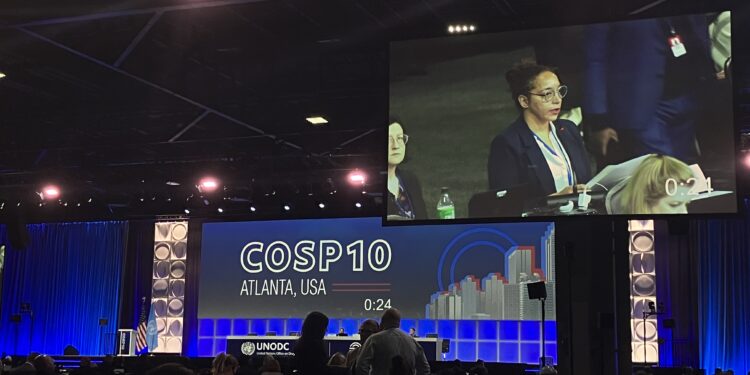On December 14, closed-door discussions of a whistleblower resolution continued at the 10th Conference of the States Parties (CoSP 10) to the UN Convention Against Corruption (UNCAC).
Alarmed when the latest draft of the resolution contained no mention of financial incentives, Siri Nelson, Executive Director of National Whistleblower Center (NWC), addressed the plenary session of CoSP10, claiming that financial incentives are critical to the success of whistleblower programs.
“We are grateful to see the recognition and energy devoted to whistleblower protection this CoSP,” Nelson said. “However, we are shocked that the merged draft whistleblower resolution has been diluted by excluding language on financial incentivization. Without financial incentivization, this resolution has no teeth.”
“Whistleblower rewards work because they change the risk dynamic, giving those who witness grand corruption the assurance of a financial safety net if they report,” Nelson continued. “In the U.S., reward laws have transformed our counter-corruption ability. We’ve seen a dramatically greater number of whistleblowers come forward, and now whistleblowers constitute 40% of those who report corruption.”
Later on in the day, Nelson once again the plenary session as the agenda moved to Asset Recovery. She again underscored the importance of awards in best practice whistleblower programs and highlighted the successes of U.S. whistleblower award laws in recovering assets from fraudsters and corrupt actors.
“Whistleblowers are the infantry in asset recovery effort,” Nelson stated. “Whistleblowers are the people who know where assets are, how they are being hidden, who is hiding them, and where and when they will be converted. And, whistleblowers are the ones willing to put their lives and their livelihoods on the line to intervene and assist law enforcement with asset recovery.”
“Reward programs that have transnational effect prevent transnational crime and asset conversion and can provide vulnerable whistleblowers with a way out of dangerous situations, foster out of country support, and create a deterrent for enablers,” Nelson continued. “And, this is why U.S. programs have gained active participation from around the world, and been able to recover billions of dollars in sanctions and repatriation of ill-gotten funds as well as a wide array of asset recovery victories from illicitly obtained wildlife, antiquities, and yachts, to cold hard cash.”
At the outset of CoSP10, two separate draft whistleblower resolutions were introduced, one by Serbia and one by Palestine. Both resolutions sought to further the protection of anti-corruption whistleblowers by encouraging States parties to implement strong reporting systems and anti-retaliation protections which afford whistleblowers anonymity. They also encouraged States parties to share their technical expertise and insights in protecting whistleblowers and called on UNCAC to conduct a study on whistleblower best practices.
The Palestinian draft resolution suggested that States parties consider implementing whistleblower awards, stating that it “encourages States parties, in accordance with their domestic law, to consider exploring whether appropriate [incentives or] awards could be offered to reporting persons who provide accurate and effective information that supports a successful corruption prosecution.”
The Serbian draft whistleblower resolution by contrast contained no mention of financial incentives or awards.
On December 13, the delegates from Serbia and Palestine agreed to merge their draft whistleblower resolutions and proceed with one merged resolution. The first draft version of this merged whistleblower resolution stripped the Palestinian call for financial incentives, instead encouraging States parties “to consider exploring whether appropriate [non-financial] incentives could be offered to reporting persons who provide accurate and effective information that supports a successful corruption prosecution.”
After closed-door discussions on the draft resolution continued, even this mention of “non-financial incentives” was completely removed from the draft resolution.
Late on December 14, Nelson addressed the plenary session of CoSP10 one last time, concluding succinctly: “At the end of the day, it is impossible to be serious about protecting whistleblowers without utilizing whistleblower rewards, and it is impossible to be serious about protecting the everyday person from corruption without utilizing whistleblower rewards.”
Further Reading:
Whistleblower Advocates Call for Best Practice Whistleblower Resolution at CoSP10
CoSP10 Commences with Strong Statements and Resolutions on Whistleblowing




